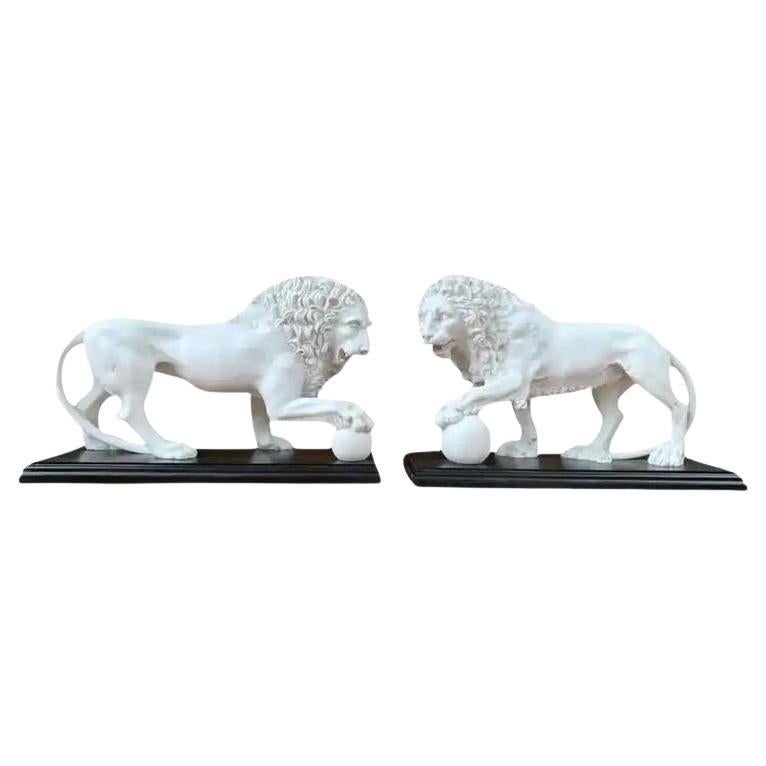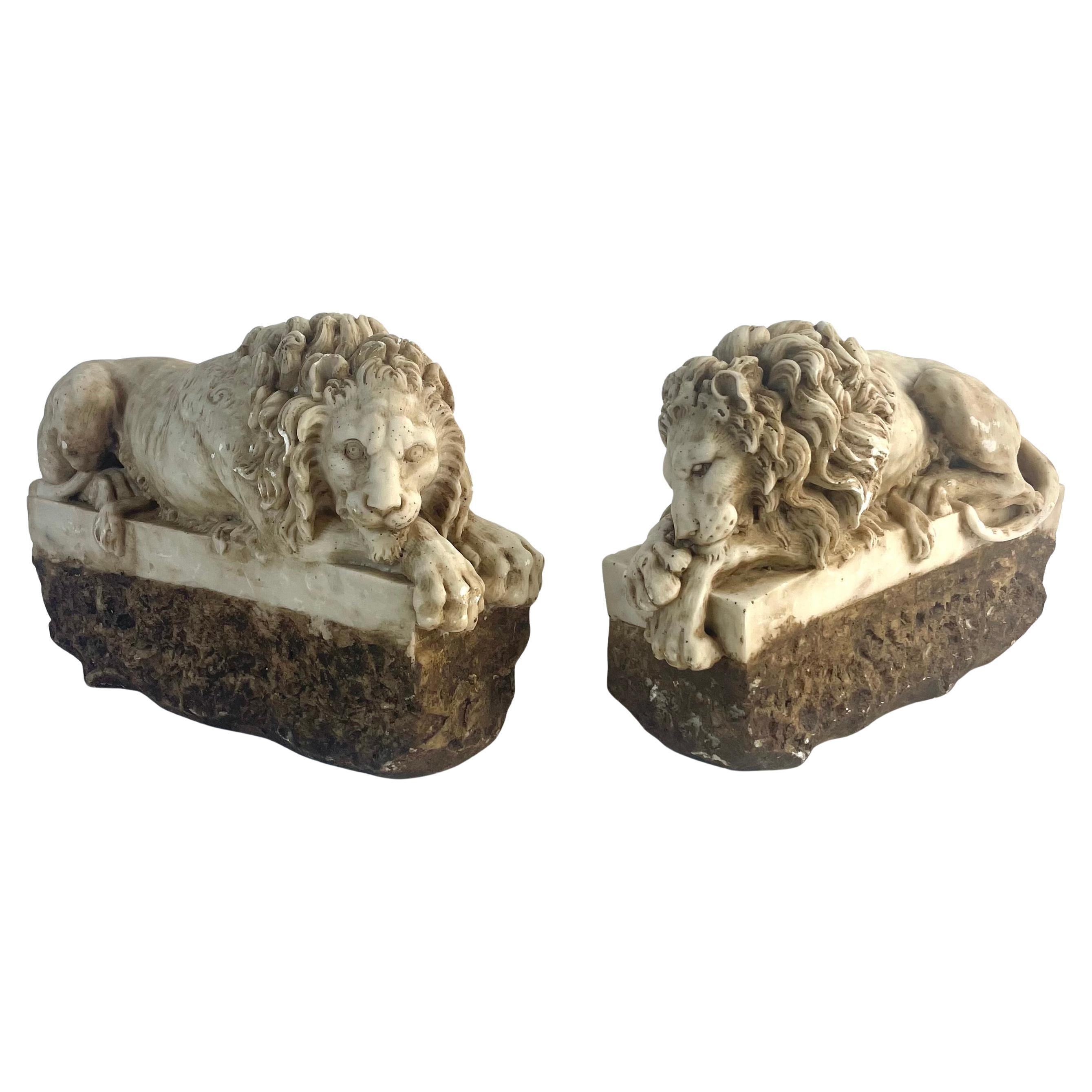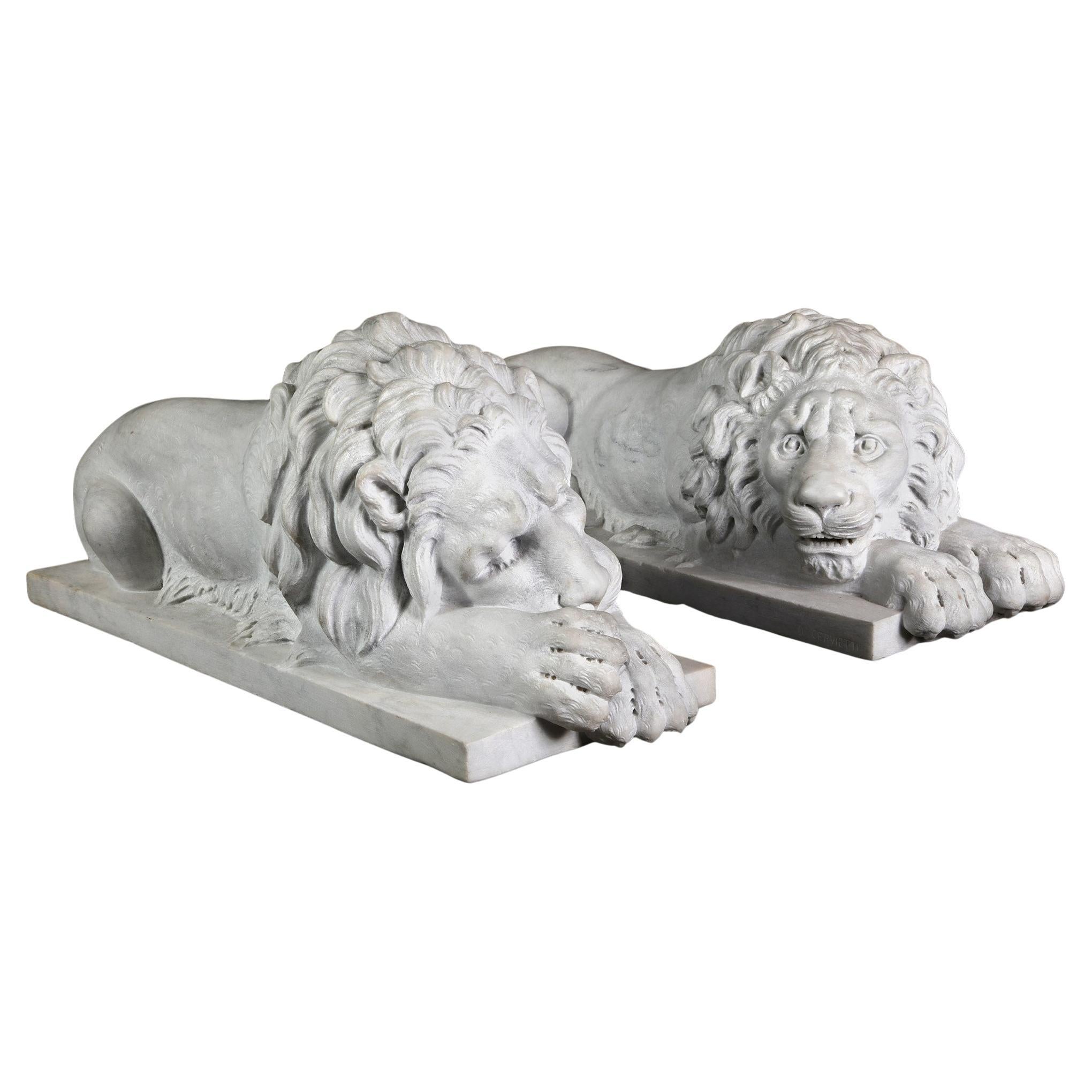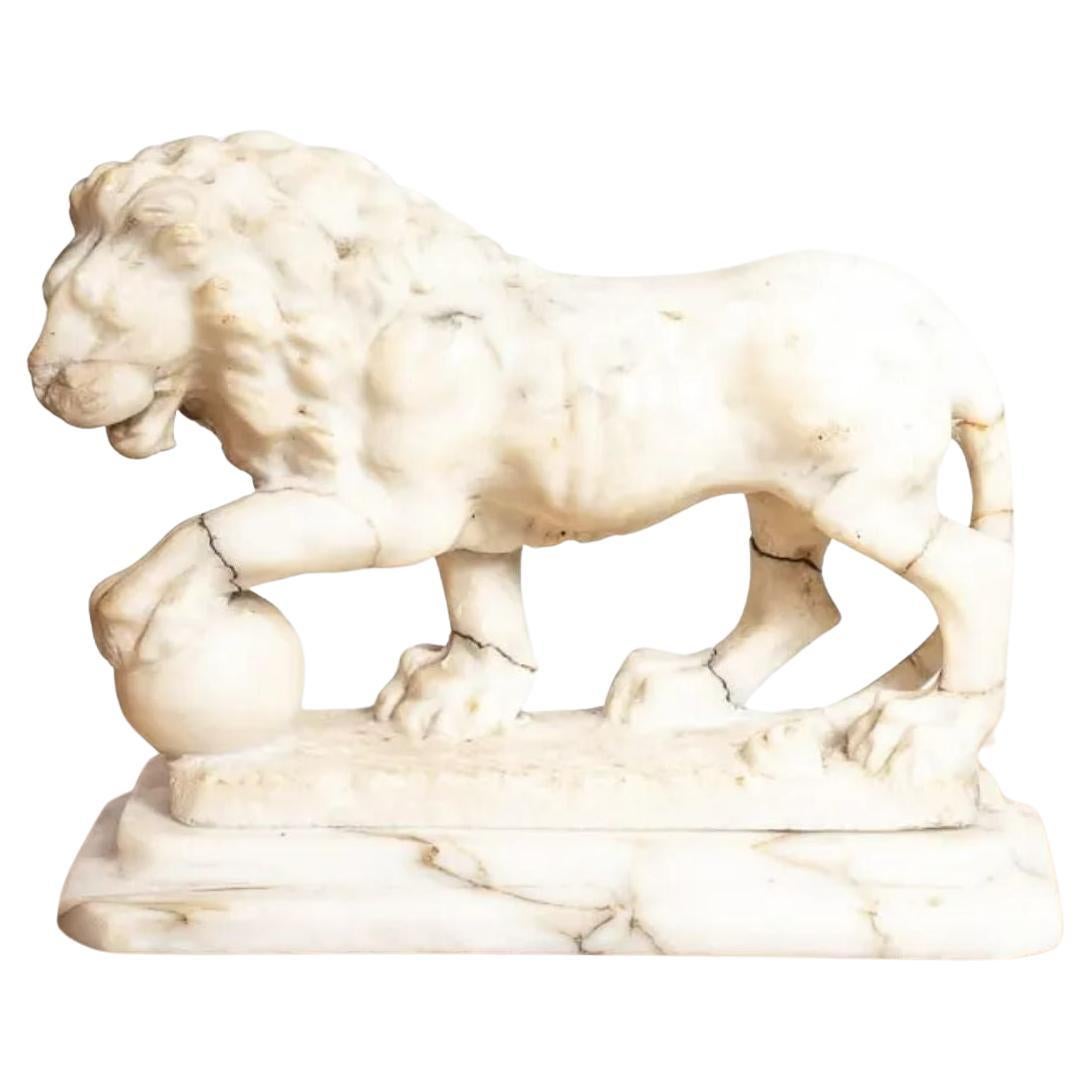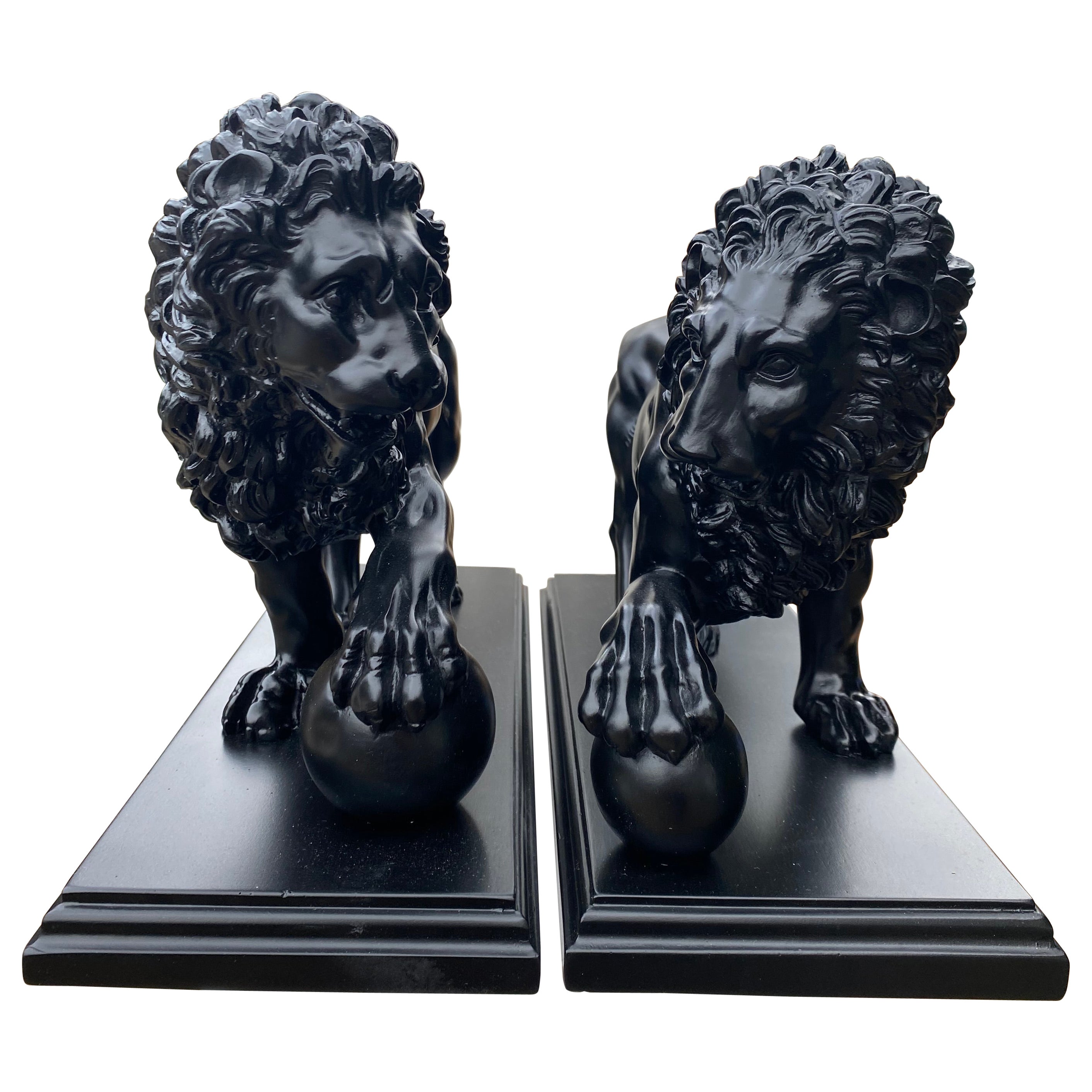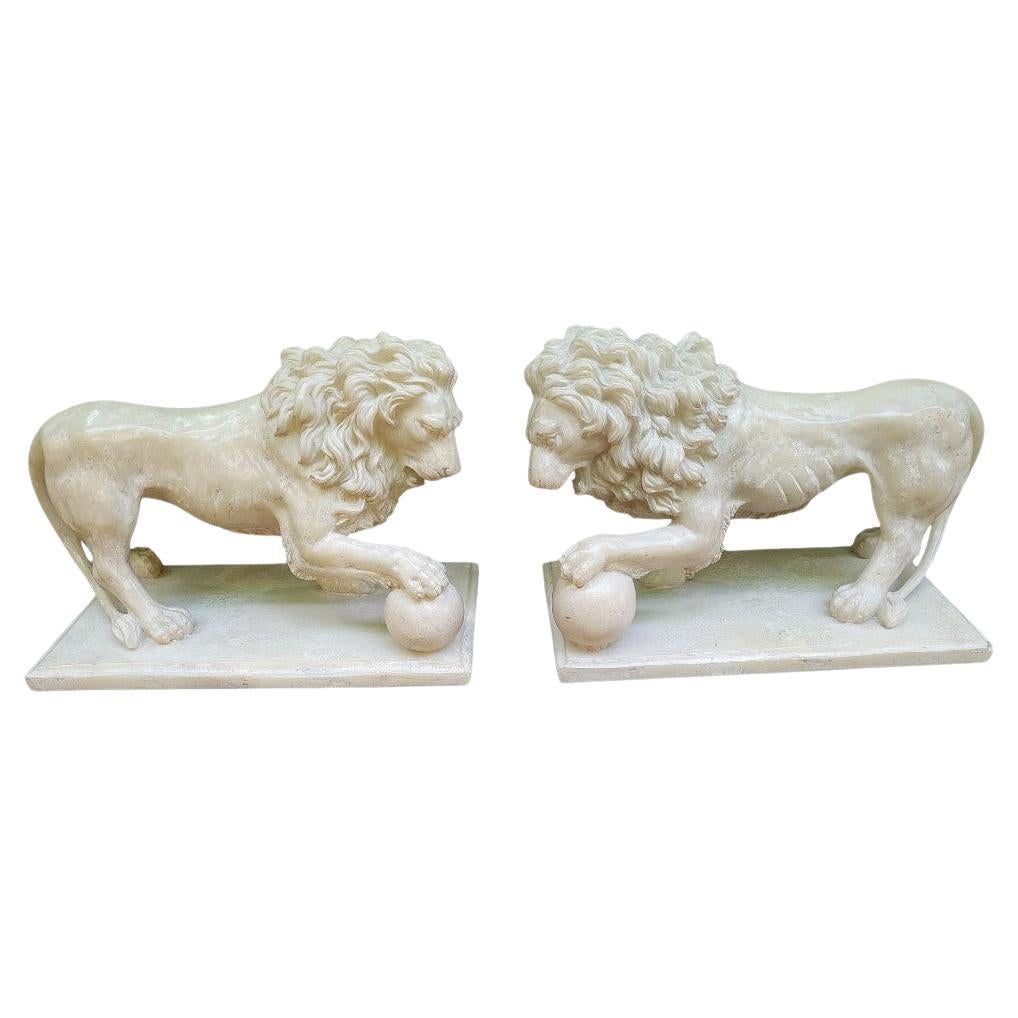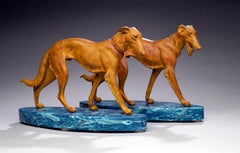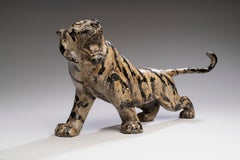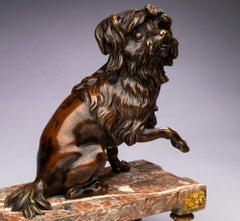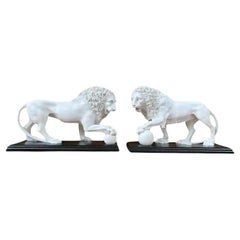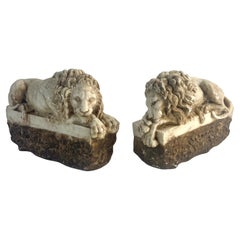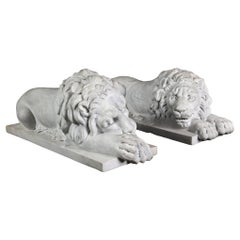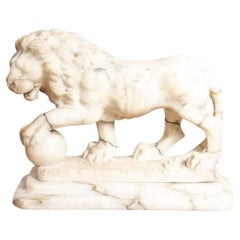Items Similar to Pair of Italian "Alabaster Stone Lions" after Antonio Canova; Mid 19th Century
Want more images or videos?
Request additional images or videos from the seller
1 of 10
UnknownPair of Italian "Alabaster Stone Lions" after Antonio Canova; Mid 19th CenturyCirca 1850
Circa 1850
$6,150
£4,695.50
€5,425.61
CA$8,633.44
A$9,622.86
CHF 5,048.79
MX$117,510.85
NOK 63,928.61
SEK 60,422.26
DKK 40,493.66
About the Item
"Pair Recumbent Stone Lions"
after Antonio Canova (1757-1822)
Italian (possibly Florence)
Mid 19th Century
Alabaster, marble
6 x 9 x 4 inches
This is an exquisite pair of Italian alabaster lions on marble bases based on the monumental lions carved by Antonio Canova (1757-1822), the greatest Italian neoclassical sculptor. Canova sculpted the marble lions for the monumental tomb of Pope Clement XIII in St. Peter’s, Rome in 1792
Canova Lions refers to the pair of copies of lion sculptures by Antonio Canova. When Canova created the sculptures in 1792, he installed them on the tomb of Pope Clement XIII. The marble sculptures are some of the most prominent features in St. Peter's Basilica in Rome. Given the intricacies of creating the original Canova lions, some artists created molds and replicated them. A good example is the pair of lion sculptures at the Corcoran Gallery of Art entrance in Washington DC which have stood in their same location since 1860. Canova was able to create such life-like, believable sculptures because as one of the premier artists in 18th-century Rome, he was known for the length of time he spent during the study phase. Canova was so meticulous that when the time came to create a sculpture, he would do it without making any corrections. With his large studio, Canova was able to execute highly-sophisticated projects for rulers like French Emperor Napoleon Bonaparte, European aristocracy and nobility as well as prominent Italian religious figures.
St. Peter's Basilica in the Vatican City is home to exquisite works of art by some of Italy's finest sculptors, including Michelangelo. Like Canova, Michelangelo took part in memorable sculptural and architectural projects. Especially notable examples of Michelangelo's work are the sculpture of David in Florence and the frescoes on the ceiling of the Sistine Chapel. Clearly Canova is in good company regarding his stature as an artist. Having worked for St. Peter's Basilica, he must have made a name for himself and attracted commissions for bigger projects. You only need to see the popularity of the Canova lions to know his impact on the world of art.
By the close examination of the two Canova lions it's possible to derive their meanings. While one lion is sleeping, the other is more vibrant. The combination of the two lions tells us about the Pope's moderate yet determined mien. Before he died, Canova made many copies of the two lions for different clients across the world. Other artists created copies many years after he had died.
The Canova lions have proved to be eternally popular images; copies were made soon after in the workshops of Rome to sell to wealthy ‘Grand Tourists’ as souvenirs from their classical tour. In England, Canova’s greatest patron was the 6th Duke of Devonshire whose seat was at Chatsworth House, Derbyshire. The Grand Tour of the late 17th, 18th and 19th centuries saw many upper class, wealthy and aristocratic gentlemen and ladies traveling to Italy and Europe for pleasure, education and inspiration. This afforded them the opportunity to view important classical and Renaissance works of art and architecture.
The term ‘Grand Tour’ was coined by the Catholic priest and travel writer Richard Lassels (circa 1603-68), who used it in his influential guidebook "The Voyage of Italy," published in 1670, to describe young lords travelling abroad to learn about art, architecture and antiquity. Robert Adam wrote of Rome in 1755, ‘Rome is the most glorious place in the universal world. A grandeur and tranquillity reigns in it, everywhere noble and striking remains of antiquity appear in it, which are so many that one who has spent a dozen years in seeing it is still surprised with something new…’
- Creation Year:Circa 1850
- Dimensions:Height: 6 in (15.24 cm)Width: 9 in (22.86 cm)Depth: 4 in (10.16 cm)
- Medium:
- Movement & Style:
- Period:
- Condition:This pair is in very fine condition and are beautifully carved.
- Gallery Location:SANTA FE, NM
- Reference Number:1stDibs: LU1408211778962
About the Seller
5.0
Platinum Seller
Premium sellers with a 4.7+ rating and 24-hour response times
Established in 1995
1stDibs seller since 2020
119 sales on 1stDibs
Typical response time: 1 hour
- ShippingRetrieving quote...Shipping from: Santa Fe, NM
- Return Policy
Authenticity Guarantee
In the unlikely event there’s an issue with an item’s authenticity, contact us within 1 year for a full refund. DetailsMoney-Back Guarantee
If your item is not as described, is damaged in transit, or does not arrive, contact us within 7 days for a full refund. Details24-Hour Cancellation
You have a 24-hour grace period in which to reconsider your purchase, with no questions asked.Vetted Professional Sellers
Our world-class sellers must adhere to strict standards for service and quality, maintaining the integrity of our listings.Price-Match Guarantee
If you find that a seller listed the same item for a lower price elsewhere, we’ll match it.Trusted Global Delivery
Our best-in-class carrier network provides specialized shipping options worldwide, including custom delivery.More From This Seller
View AllAntique Pair of Russian Wolf Hound/Borzoi Dog Portrait Sculptures circa 1930's
Located in SANTA FE, NM
Antique Pair of Russian Wolfhounds/Borzois Dog Portrait Sculptures
by Scalini (aka Scali; Italian, 20th century)
circa 1930's
Patinated spelter
9 x 14 inches (on bases)
Though rath...
Category
1920s Art Deco Figurative Sculptures
Materials
Cast Stone, Bronze
$2,310 Sale Price
40% Off
Pair of Japanese Buddhist, Meiji Period Foo-Dogs; Satsuma Kilns, 19th Century
Located in SANTA FE, NM
Pair of Buddhist Foo Dogs
Polychrome porcelain
Japan, Meiji era (1868 – 1912), circa late 19th century
Satsuma Kilns
12 3/8 x 9 5/8 inches
This exquisite pair of Japanese Foo-dogs ...
Category
Late 19th Century Other Art Style Figurative Sculptures
Materials
Porcelain
Painted Cast-Metal Tiger circa 1900
Located in SANTA FE, NM
Painted Cast-Metal Tiger
Continental School, circa 1900
8.75 x 19.5 inches
Ex. Collection Interior Designer Joseph Cicio
Born and raised in Brooklyn, New York, Joseph Cicio followe...
Category
Early 20th Century Academic Figurative Sculptures
Materials
Metal
Antique 19th century Bronze Dog Portrait of a Löwchen on a Marble Base
Located in SANTA FE, NM
Antique Bronze Dog Portrait of a Löwchen on a Marble Base
French 19th century
1/2 x 8 x 5 1/2 inches
The chiseled bronze has a nuanced, rich brown patina depicting a Löwchen in the round, seated on a quadrangular marble base decorated with very fine gilt bronze flowers and fluted feet. Napoleon III, Louis XVI style. Based on a model by Jacques Caffieri for the Prince de Condé in 1773.
(More images to be added.)F
Executed during the nineteenth century, this figure is fully in line with the eclectic taste of the reign of Napoleon III. Indeed, the Empress Eugenie brought the Louis XVI style up to date in her castle of Compiègne. Jacques Caffieri is one of the most famous bronze smiths of the eighteenth century. In 1715 he was admitted as a master caster and chiseler, and worked almost exclusively for the crown castles...
Category
19th Century Rococo Figurative Sculptures
Materials
Marble, Bronze
Antique Dog: Bulldog Playing with a Mouse- Henri Émile Adrien Trodoux ca. 1870s
Located in SANTA FE, NM
Antique Bronze Dog
Bulldog Playing with a Mouse on Sheaves of Wheat
Henri Émile Adrien Trodoux (1815-1881)
6 1/8 x 3 7/5 inches
Signed on the terrace
Henri Émile Adrien Trodoux (Fre...
Category
Mid-19th Century Realist Figurative Sculptures
Materials
Bronze
"Horse Playing with a Dog" Pierre Lenordez (1815-1892) circa 1860
By Pierre Lenordez
Located in SANTA FE, NM
"Saddled Horse Playing with a Dog"
Pierre Lenordez (1815-1892)
Bronze with green marble base, circa 1860
11 x 7 inches
Painter and sculptor, professor at the Academy of Fine Arts ...
Category
1860s Realist Figurative Sculptures
Materials
Bronze
You May Also Like
Pair of Marble Sculptures Medici Lions, 20th Century
Located in Southall, GB
This is a beautifully sculpted pair of decorative composite marble lions with balls from the originals at Villa Medici, Rome, dating from the last quarter of the 20th century.
They ...
Category
20th Century European Animal Sculptures
Materials
Marble
Pair of Italian Stoneware Lions After Antonio Canova, 19th Century
By Antonio Canova
Located in Knivsta, SE
Pair of Italian Stoneware Lions After Antonio Canova, 19th Century
A striking pair of reclining lions in stoneware, inspired by the monumental sculptures created by Antonio Canova ...
Category
Antique 1840s Italian Animal Sculptures
Materials
Stoneware
Danilo Cervietti Pair of Marble Canova Lions - Second half 20th Century
Located in Baambrugge, NL
This impressive pair of white marble lions was sculpted by the renowned Italian artist Danilo Cervietti (20th Century). The sculptures are loosely modeled after the style of Antonio ...
Category
Mid-20th Century Italian Animal Sculptures
Materials
Marble
Italian Alabaster Figure of The Medici Lion, 19th Century
Located in London, GB
Italian Alabaster Figure of the Medici Lion
Late 19th century Italian carved alabaster 'Grand Tour' souvenir sculpture, after the antique, "The Medici Lion". Carved alabaster mode...
Category
Antique 19th Century Italian Renaissance Animal Sculptures
Materials
Alabaster
The Medici & Vacca Lions - 20th Century Marble Sculpture Pair
Located in Southall, GB
This distinguished pair of 20th-century marble sculptures, known as the Medici and Vacca Lions, captures the timeless elegance of these iconic lion figures. Each lion is meticulously...
Category
20th Century European Animal Sculptures
Materials
Marble
Pair of Italian Medici Resin Lion Sculptures
Located in London, GB
A Lovely Pair of Medici Lions C20th
The Original Lion Decorated the Entrance to the Famous Villa Medici in ROma
Italian Work from the Grand Tour
These Sculptures are of Good size a...
Category
20th Century Unknown Renaissance Animal Sculptures
Materials
Resin
$1,185 / item
More Ways To Browse
Italian Sculpture Stone
Marble Lion
Marble Lions
Antique Lion Sculpture
Renaissance Art Pairings
Antique Alabaster Sculpture
Large Lion Sculpture
Antique Catholic Art
Sculpture Of Two Lions
17th Century Lion
Antique Stone Lions
Stone Emperor
Lion Marble Sculpture
Italian Marble Lions
19th Century Italian Alabaster
Lion Art By England
19th Century Alabaster Sculpture
Marble David Sculpture
